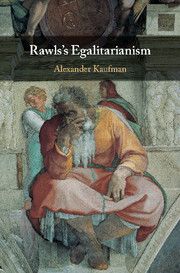By Amanda Tysor
Dr. Alexander Kaufman, an associate professor of political science, has made a major contribution to political theory with his book Rawls’s Egalitarianism, recently published by Cambridge University Press.
After developing an interest in politics, Kaufman chose to attend law school with hopes of becoming involved in the public sector. He spent the early years of his career gaining experience in corporate law, where he found that despite his years in law school, many fundamental questions regarding justice and equality remained unanswered. Moving into academia and political theory at the University of Chicago, he focused his dissertation and Ph.D. studies on the philosophy of Kant.
“The undergraduate courses I teach [at UGA] had a big effect on the direction I’ve taken,” Kaufman recalls. “Given that the study of theorists such as Kant require intense background reading and previous knowledge, I decided to focus [my undergraduate courses] on John Rawls, a more modern theorist oriented by Kant’s teachings.”
It was this new focus on John Rawls that led to his forthcoming Cambridge Press publication, a book focusing on Rawls’s theories of distributive justice and debunking classical criticisms and common misperceptions. Critics of Rawls often skip over the foundational justifications behind his theories, so Kaufman begins by laying out the basic characteristics of justice. This background then serves as the basis for a discussion on democratic equality and distributive justice theory.
Most scholars argue that Rawls employs the difference principle too strongly, emphasizing a ‘tax the rich and give to the least advantaged’ mentality. Rawls’ conception of egalitarianism, Kaufman argues, is derived from Rawls’ understanding of equality of economic opportunity and fair distribution of social goods. “[The difference principle] is simply a footnote at the end of a rich theory on justice concluding that we must grant basic liberties and fair equality of opportunity,” Kaufman explains.
Kaufman concludes the piece with a strong chapter on applications of Rawls’ theories to the public sector, a unique addition allowing the largely theoretical work to become foundational and effective in today’s political sphere. “Success of other people is part of our good,” Kaufman stresses, and he demonstrates that an understanding of the theory behind justice and egalitarianism is crucial if one is to implement successful and influential policy.
Link to purchase the book: https://www.cambridge.org/core/books/john-rawls-and-egalitarianism/150913B2708C83D4D4A2147DF499A792






